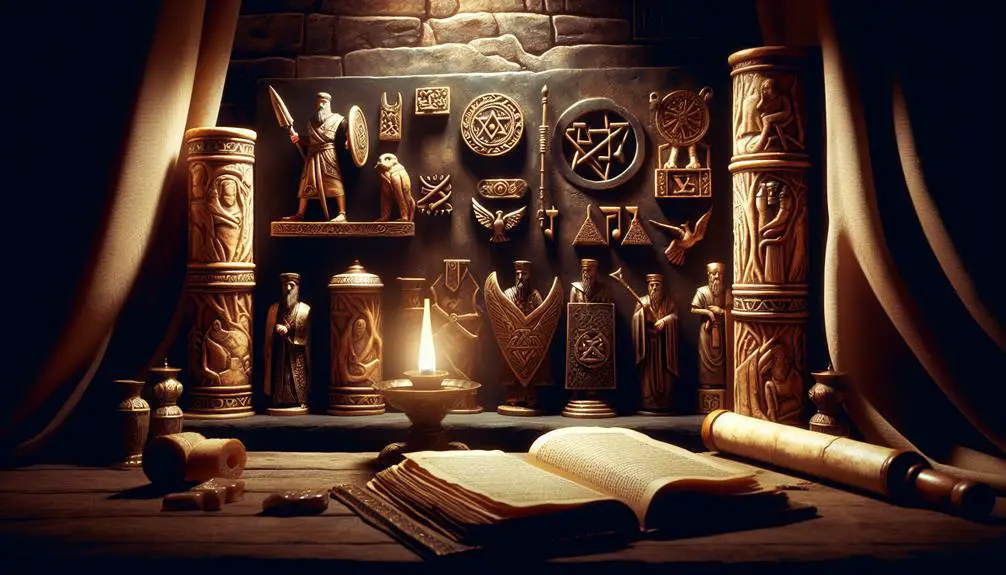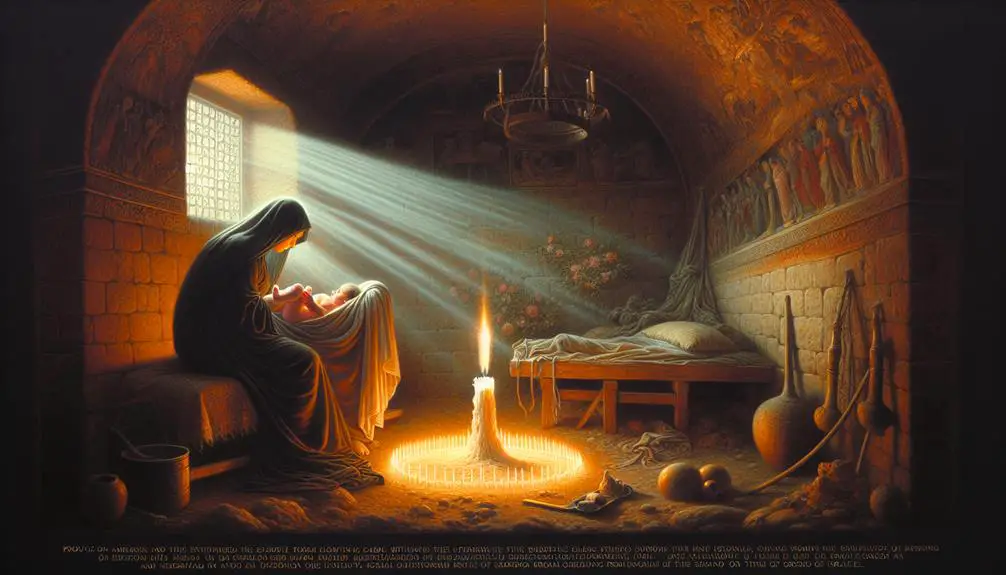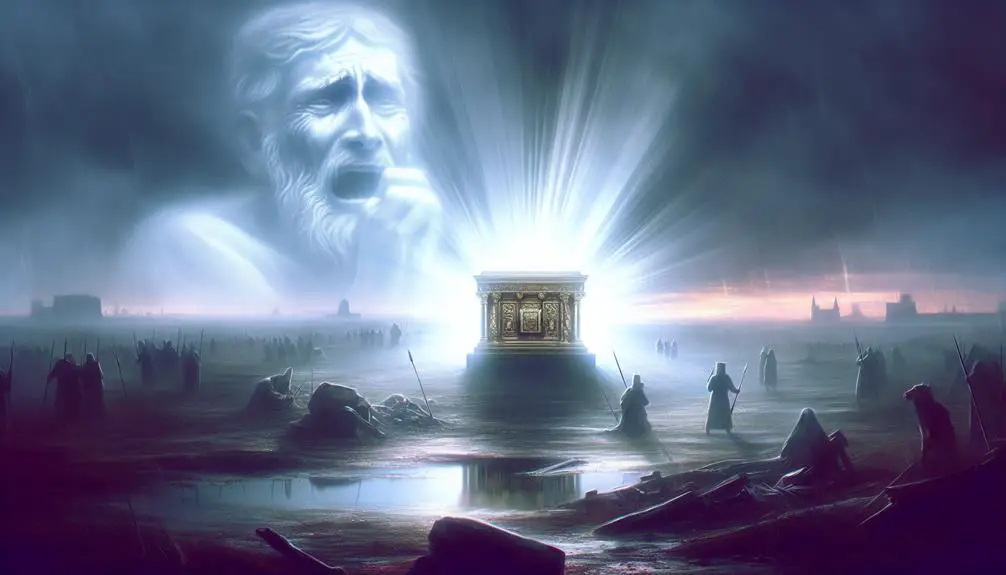Discover Ichabod's tragic tale in the Bible, where his name signifies a profound loss and a turning point in Israel's history.

Who Is Ichabod in the Bible
Like a whisper from the past, the name Ichabod carries with it a tale of sorrow and a pivotal moment in Israel's history.
You might find yourself intrigued by his story, birthed from tragedy during a time when the Ark of the Covenant was captured, signaling a shift in Israel's favor with God.
His name, meaning 'the glory has departed from Israel,' offers more than just a lament; it serves as a profound reflection on the consequences of spiritual and moral decay.
As you ponder Ichabod's significance, you'll uncover layers of historical and spiritual insights, revealing why his narrative remains relevant and compelling today.
Key Takeaways
- Ichabod's name, meaning 'no glory,' symbolizes the departure of God's presence from Israel due to spiritual and leadership failures.
- He was born during a period of national crisis, highlighting the consequences of neglecting God's covenant and moral decline.
- His birth coincides with the loss of the Ark of the Covenant, emphasizing the severe implications of disobedience to God's commands.
- Ichabod's story serves as a cautionary tale about the importance of covenant fidelity and the dangers of neglecting spiritual commitments.
The Historical Context

To understand Ichabod's significance in the Bible, it's essential to first grasp the historical context in which his story is set. Ichabod emerges during a tumultuous period in Israel's history, marked by persistent Philistine conflict and a leadership crisis within Israel itself. This era, characterized by the transition from the rule of judges to the establishment of a monarchy, is a critical juncture for understanding the narratives that unfold.
The Philistine conflict represents a significant external threat to Israel's stability and prosperity. As a formidable enemy, the Philistines are often depicted as a catalyst for Israel to evaluate and consolidate its leadership and identity. This ongoing struggle not only sets the stage for pivotal battles but also highlights the vulnerabilities and divisions within Israel's tribes. It's within this backdrop of warfare and societal upheaval that Ichabod's narrative gains its depth and poignancy.
Israel's leadership, on the other hand, is in a state of flux and transformation. The era preceding Ichabod's birth is marked by the diminishing influence of the judges, who were both military and spiritual leaders. This decline in the judges' authority paves the way for the demand for a more centralized form of governance, eventually leading to the establishment of the monarchy. This shift reflects the internal challenges Israel faces, including the need for unity, a clear direction in governance, and an effective response to external threats.
In essence, Ichabod's story is deeply intertwined with the broader dynamics of Philistine conflict and the transformation of Israel's leadership. Understanding this context is crucial for comprehending the significance of his narrative within the biblical framework.
Ichabod's Birth Story

Amid this backdrop of conflict and leadership upheaval, Ichabod's birth story unfolds, offering a poignant reflection of Israel's national crises. His entry into the world is marred by tragedy, most notably his mother's demise, which occurs during childbirth. This event isn't just a personal tragedy for Ichabod's family but also serves as a symbolic moment, reflecting the broader turmoil and despair engulfing Israel at the time.
Ichabod's mother, the wife of Phinehas and daughter-in-law to Eli, the high priest, dies after receiving the devastating news of the Ark of the Covenant's capture by the Philistines and the deaths of her husband and father-in-law. These events signify a critical point in Israel's history, underscoring the consequences of straying from divine commandments and the failures of its priestly leadership. Ichabod's birth, therefore, occurs at a moment of both physical and spiritual crisis for the nation.
The circumstances surrounding his birth also highlight the end of an era for Israel's priestly lineage. With Eli and his sons' deaths, the direct line of priestly succession faces a significant disruption. Ichabod's arrival into a world without his father and grandfather, both of whom were central figures in the priesthood, further emphasizes the vacuum in spiritual leadership and the dire state of Israel's religious institutions.
The Significance of His Name

The name 'Ichabod' carries profound significance, reflecting the dire state of Israel following the capture of the Ark and the deaths of his father and grandfather. This choice of name wasn't arbitrary but laden with deep cultural implications and a dismal prognosis for Israel's spiritual and political future. Here's an analytical exploration of its meaning and the broader ramifications:
- Name interpretation:
Literally translated from Hebrew, Ichabod means 'no glory' or 'the glory has departed.' This interpretation isn't just a nominal designation but a profound commentary on the state of affairs. It symbolizes the departure of God's glory from Israel, a nation that had, until then, been under divine protection. The naming of Ichabod, therefore, isn't merely a personal identifier but a national lament.
- Cultural implications:
In biblical times, names were imbued with significant meaning, often reflecting the circumstances at birth or a prophecy over the individual's life. Ichabod's name serves as a perpetual reminder of a pivotal moment in Israel's history, where their spiritual disconnect from God manifested in tangible loss. It underscores the cultural practice of using names as markers of divine relationship and societal fortunes.
- Reflective of broader themes:
The naming of Ichabod encapsulates themes of divine presence, judgment, and the consequences of disobedience. It invites reflection on the transient nature of glory and the necessity of remaining faithful to avoid spiritual desolation. Through this lens, Ichabod's story transcends personal tragedy, echoing a cautionary tale about collective accountability and the pursuit of righteousness.
The Ark of the Covenant

Central to Israel's spiritual identity and national history, the Ark of the Covenant symbolizes God's presence and covenant with His people. Its construction, detailed in the Book of Exodus, was a divine directive meant to physically manifest the intangible relationship between God and Israel. Made of acacia wood and overlaid with gold, the Ark housed the tablets of the Ten Commandments, Aaron's rod, and a pot of manna—each an emblem of God's guidance, provision, and expectations.
The Ark's role extended beyond a mere religious artifact; it was integral to covenant renewal ceremonies and pivotal moments where Israel's fidelity to God was affirmed or tested. Its presence within the Tabernacle, and later the Temple in Jerusalem, served as a continual reminder of God's immediate presence and His covenant promises. This sacred chest wasn't only central to national worship but also symbolized God's willingness to dwell among His people, guiding and protecting them.
The process of Ark construction and the rituals associated with its care underscored the seriousness with which God's covenant was to be regarded. Every detail of its creation, from materials used to the artisans chosen, reflected divine specifications intended to underscore holiness and the importance of obedience to God's commands.
In times of covenant renewal, the Ark served as a focal point, reminding the Israelites of their unique relationship with God and their responsibilities within this covenant. It was a tangible connection to their past deliverances and a prophetic symbol of future hope. Through the Ark, God's presence was made manifest, reinforcing the covenant's significance and the necessity of Israel's compliance to maintain this sacred relationship.
Lessons From Ichabod's Tale

Reflecting on the Ark of the Covenant's significance, it's crucial to explore the story of Ichabod, which offers profound lessons about the consequences of straying from God's covenant. Ichabod's tale isn't just a narrative of personal tragedy but a cautionary story that encapsulates the broader themes of spiritual decline and leadership failure in the biblical context. Through his story, you're invited to ponder the pivotal role of covenant fidelity and the dire implications of its neglect.
Here are three key lessons from Ichabod's tale:
- The Gravity of Spiritual Decline: Ichabod's birth coincides with the loss of the Ark of the Covenant to the Philistines, symbolizing a profound spiritual decline among the Israelites. This event teaches you that spiritual neglect can lead to a loss of God's presence, which is depicted through the physical loss of the Ark, a central symbol of God's covenant with Israel.
- The Consequences of Leadership Failure: The circumstances surrounding Ichabod's birth highlight the devastating effects of leadership failure. His father, Phinehas, and uncle, Hophni, were priests who dishonored God, leading to their deaths and the capture of the Ark. Their actions serve as a stark reminder that leadership comes with the responsibility to uphold God's statutes and that failure to do so can result in severe repercussions.
- The Importance of Covenant Fidelity: Above all, Ichabod's story underscores the importance of remaining faithful to God's covenant. It illustrates that deviation from God's commands can lead to spiritual desolation and the loss of divine favor.
Through these lessons, Ichabod's tale serves as a critical reflection on the consequences of neglecting spiritual commitments and the vital need for covenant fidelity.
Frequently Asked Questions
How Does Ichabod's Story Reflect the Spiritual State of Israel During His Time?
Ichabod's story mirrors the spiritual decline and priestly corruption in Israel, highlighting the erosion of their national identity. It's a cautionary tale, showing how leadership's moral failures directly impact a nation's spiritual health.
This narrative serves as a critical reflection on the consequences of abandoning core values and the importance of integrity among spiritual leaders. Through Ichabod's experience, you see a vivid illustration of the spiritual crisis facing Israel during his era.
Are There Any References to Ichabod Outside the Biblical Narrative, Such as in Historical Texts or Archaeological Findings?
You might find it intriguing that archaeological speculation and historical validation of characters from ancient texts are rare.
Regarding your question, there aren't significant references to Ichabod outside the biblical narrative in historical texts or archaeological findings. This absence highlights the challenges in corroborating biblical stories with external evidence.
It's a fascinating intersection of faith and history, where the lack of concrete proof outside scripture leaves much to interpretation and scholarly debate.
How Has the Character of Ichabod Been Interpreted or Depicted in Modern Literature and Media?
In modern literature and media, you'll find Ichabod's character often enveloped in Gothic interpretations, reflecting a deep, cultural symbolism. This portrayal emphasizes themes of loss, mystery, and the supernatural, diverging significantly from the original biblical narrative.
Through these lenses, Ichabod becomes a symbol of broader societal fears and anxieties, demonstrating how characters can evolve beyond their initial contexts to acquire new meanings in contemporary cultural discourse.
What Theological Implications Can Be Drawn From the Circumstances Surrounding Ichabod's Birth and the Loss of the Ark?
Imagine a scene where divine presence departs amidst chaos, and maternal mortality seals a tragic event.
You're delving into a narrative where the loss of the ark and Ichabod's birth intertwine to underscore theological lessons.
This scenario suggests that divine favor isn't guaranteed, and leadership's moral failures can lead to its withdrawal.
It's a poignant reminder of the consequences of straying from spiritual integrity and the fragility of human life.
How Do Scholars Reconcile the Story of Ichabod With the Broader Themes of Divine Judgment and Mercy in the Old Testament?
You're exploring how scholars reconcile specific narratives with overarching Old Testament themes, particularly divine judgment and mercy. They often view these stories through a lens of Divine Redemption and Mercy Interpretation.
This approach emphasizes that even in moments of harsh judgment, there's a thread of mercy and potential for redemption. It's an analytical balance, acknowledging both the consequences of actions and the enduring possibility of divine compassion and forgiveness.
Conclusion
In drawing the curtains on Ichabod's narrative, it's clear you've navigated through a saga where history, tragedy, and divine symbolism intertwine like vines in an ancient tapestry.
His name, a lament echoing through the ages, serves as a stark reminder that glory can disappear quicker than a shooting star on a summer's night.
Analyzing Ichabod's story offers invaluable lessons on faith, leadership, and the consequences of spiritual negligence, underscoring the timeless message that where divine presence is absent, glory fades into oblivion.



Sign up